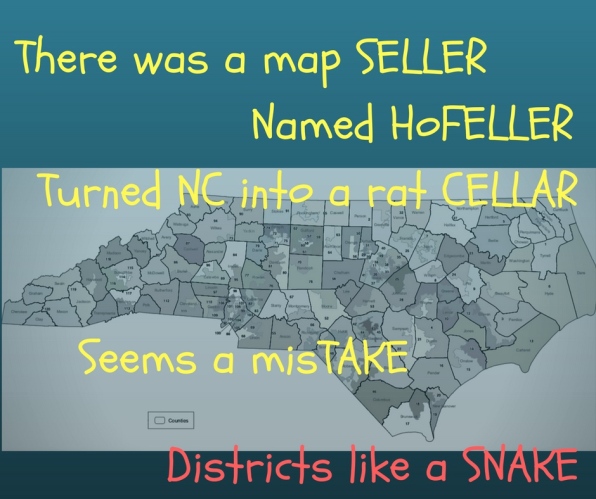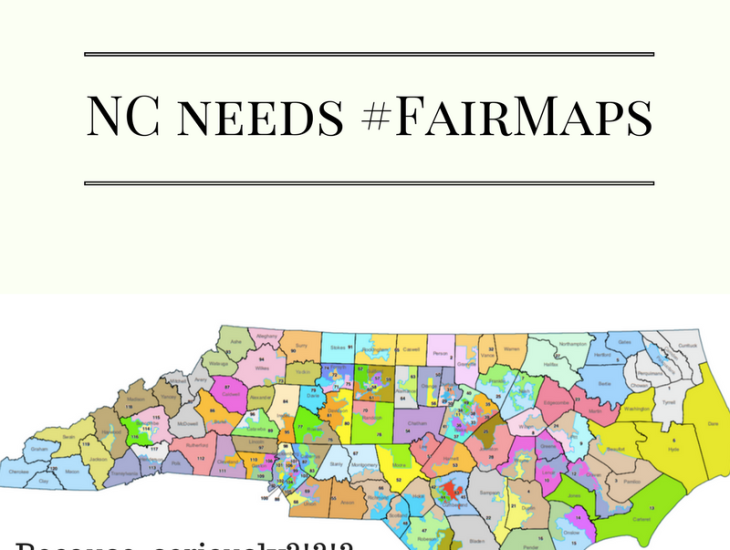There are at least five ongoing cases based on North Carolina’s 2011 electoral district maps. As of February 15, 2017, two NC gerrymandering cases have actions currently pending before the Supreme Court of the United States (SCOTUS); one case has been up to SCOTUS, sent back down to a lower court and appealed to SCOTUS again; and two cases are pending in US District Court. In addition to paying for the consultant who drew the 2011 maps, Tom Hofeller, North Carolina taxpayers are footing the bill to defend the North Carolina General Assembly’s gerrymandered districts in court.
Every 10 years, congressional districts are redrawn in connection with the US Census. North Carolina draws its State Senate and State House districts at the same time. The process for drawing districts varies from state to state – almost half of the states have some sort of redistricting commission, while in others the districts are drawn by the state legislature and subject to veto by the governor. North Carolina is one of a handful of states in which the state legislature is given carte blanche to draw the district lines – redistricting is not subject to the governor’s veto and there is no redistricting commission. The North Carolina General Assembly (NCGA) draws the districts to suit itself.
The two NC gerrymandering cases with actions currently pending before SCOTUS are “Harris v. McCrory” and “Covington v. North Carolina”. Harris concerns North Carolina’s US Congressional Districts, and has been heard by SCOTUS but there is not a ruling on the case yet. Covington concerns the North Carolina General Assembly districts (both the NC State House of Representatives and the NC State Senate) and has been appealed to SCOTUS, but SCOTUS has not yet announced whether it will hear the case – or if the 2017 Special Elections ordered by the lower court will proceed.
Both cases are based on electoral district maps drawn after the 2010 census by Tom Hofeller, a private consultant hired by State Senator Rucho and State Representative Lewis. In each case, United States District Courts ruled that the 2011 maps drawn by Dr. Hofeller at the behest of Rucho and Lewis were unconstitutional. Specifically, the 2011 maps violated the Equal Protection Clause of the Fourteenth Amendment to the US Constitution because of impermissible racial gerrymandering.
Dr. Thomas Hofeller was deployed as part of the Republican State Leadership Committee’s Redistricting Majority Project (REDMAP) and has been profiled in The Atlantic’s “The League of Dangerous Mapmakers” and in David Daley’s book “Ratf**ked”.
In both Harris and Covington, the US District Court Opinions tell the story of Hofeller being instructed by Rucho and Lewis in private meetings to draw maps that “packed” African-American voters into the strangely shaped districts that gave rise to these court cases. The Court Opinions report testimony that Rucho and Lewis gave directions to Hofeller verbally so that there would not be email records of the instructions. Hofeller did not attend or read transcripts of any of the NCGA’s redistricting committees meetings, or any public redistricting forums.
Harris v. McCrory — North Carolina’s U.S. Congressional Districts
In Harris, the Federal District Court found North Carolina’s US Congressional Districts to violate the Equal Protection Clause of the Fourteenth Amendment because of impermissible racial gerrymandering. SCOTUS heard oral arguments on Harris in December, but has not published a ruling on the case.
At issue in Harris are NC US Congressional Districts 1 and 12 (CD1 and CD12), which were “packed” with a large percentage of African-American voters in order to “bleach” the surrounding districts and create “safe” conservative seats when the NCGA redrew the maps in 2011.
Prior to the 2011 maps, the winning candidates in CD1 and CD12 had the support of African-American voters. The NCGA ignored the history of minorities electing the representatives of their choice, and, citing the Voting Rights Act, instructed Hofeller to design districts were over half of the voting age population was African American. The NCGA claimed that the Voting Rights Act (“VRA”) justified the gerrymandered districts, and argued that complying with the VRA was the “government interest” that allowed them to “pack” these two districts.
Increasing the African-American voters packed in CD1 and CD12 meant that coalitions of African American and white voters were split, with progressive whites vastly outnumbered by conservative-voting whites in the surrounding districts.
Rucho and Lewis’s stated reason for the racially gerrymandered districts were that the gerrymanders were REQUIRED by Section 2 of VRA. The VRA was passed in 1965 in response to the Civil Rights Movement for the purpose of overcoming legal barriers that prevented African Americans from exercising their right to vote.
The Federal Court held that the unconstitutional maps “affected North Carolina citizens’ fundamental right to vote, in violation of the Equal Protection Clause” and ordered the NCGA to redraw those districts. The NCGA redrew the maps and approved new congressional boundaries, although the plaintiffs here and elsewhere have alleged that the new map created an impermissible partisan gerrymander.
Covington V. North Carolina – North Carolina State House and State Senate districts
The Covington case concerns North Carolina State House and State Senate legislative districts, and was the basis for the court-ordered 2017 Special Election that is currently “on hold” pending SCOTUS’ decision as to whether or not it will hear the case (a process called granting “certiorari” or “cert.”).
On August 11, 2016, a Federal three-judge panel found that the districts drawn FOR and BY the NCGA violated the US Constitution, and ordered that new maps be drawn at NCGA’s “next session” noting that North Carolinians “have the right to vote in districts that accord with the Constitution”.
On Nov. 29, 2016, the Court issued an Order requiring the NCGA to redraw the districts by March 15, and hold special elections in November 2017. The NC GOP appealed the case to SCOTUS. After holding three “Special Sessions” in which no new maps were drawn, the NC GOP then requested that the court issue a temporary “stay” (or halt) of the lower court’s order to hold special elections in 2017, which has now been granted.
The Covington plaintiffs challenged the constitutionality of nine NC State Senate districts and nineteen NC State House of Representatives districts “as racial gerrymanders in violation of the Equal Protection Clause of the Fourteenth Amendment to the United States Constitution.” Just as in Harris, the districts were drawn so as to “pack” African American voters into “Majority-Minority” districts that would be more than 50% African American. Just as in Harris, this resulted in the surrounding “bleached” districts being “safe” districts for conservative candidates.
Prior to the 2011 maps, coalitions of black and white voters were electing the preferred state representative of African American voters – yet the mapmakers alleged that the VRA Section 2 “remedy” not only allowed, but REQUIRED them, to “pack” African American voters into strange “steroid” gerrymanders so as to have districts in which minority voters were the majority (referred to in court documents as “Minority-Majority” districts).
Since August 2016, the GOP-controlled NCGA has continued to refuse to draw constitutional maps, choosing instead to spend their time in litigation. Under current law, even if the NCGA has to re-draw the maps, they may still draw them more or less however they want, so long as the maps comply with the US Constitution. They are not required to be impartial or evenhanded. However, if the plaintiffs convince the judge that the new redistricting map is also racially gerrymandered, the judge will invite the plaintiffs to submit their own map.
RELATED CASES:
Dickson v. Rucho: Originally filed in North Carolina Sate Court, Dickson challenged North Carolina’s 2011 congressional map. The case went to the NC State Supreme Court, then went up to SCOTUS, which sent it back to North Carolina with instructions to “try again” (I am paraphrasing) in light of SCOTUS rulings, the NC Supreme Court tried again, and now the case has been appealed to SCOTUS again. See a summary with links to key filings here: http://www.brennancenter.org/legal-work/dickson-v-rucho
Common Cause v. Rucho: Case filed in US District Court in August challenging North Carolina’s redrawn congressional map, adopted in 2016 after the earlier map was struck down by the courts, as an unconstitutional partisan gerrymander.
League of Women Voters v. Rucho: This lawsuit was filed in September and also challenges the state’s remedial congressional map, claiming it is an unconstitutional partisan gerrymander.
The Brennan Center for Justice has summaries of pending redistricting cases and and links to key filings here and here.
FOR MORE INFORMATION:
Check out this great Series of Blog Posts on Gerrymandering on Amy Worley’s Blog
You can find links to the NC maps, and other related information on the NC Legislature website.
More redistricting resources are available on the “National Conference of State Legislatures” page.
Check out this Redistricting Blog by a Loyola Law School professor and his interns.
This Election Law blog covers all voting rights issues, including redistricting.
The “Citizen’s Guide to Redistricting” put out by the Brennan Center for Justice has a good overview of redistricting; however, note that it is from 2010 and the sections on the Voting Rights Act are no longer accurate because of more recent court cases.
For a great overview of the history of redistricting in North Carolina and applicable law, read this illuminating law review article, “Race as a Tool in the Struggle for Political Mastery: North Carolina’s ‘Redemption’ Revisited 1870-1905 and 2011-2013“. It is really good.
The Constitution Project has a nice short film on the “One Person, One Vote” standard, starting with Baker v. Carr in 1962 and Reynolds v. Sims in 1964 : http://www.theconstitutionproject.com/portfolio/one-person-one-vote/
Common Cause is an organization dedicated to democracy that advocates for redistricting reform, and has a lobbying effort in North Carolina.


